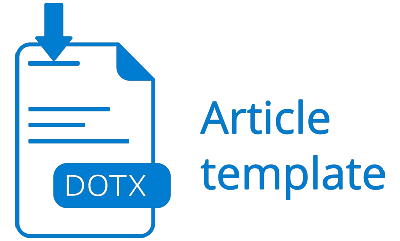Effect of Learning Orientation on Innovation: A Mediating Role of Knowledge Competence
Abstract
The purpose of this research was to investigate the effect of learning orientation on innovation, and knowledge competence as a mediator between learning orientation and innovation. The research collected data from 70 managers of manufacturing SMEs in Bali Province responded to the research questionnaires, and then the data were analyzed by using structural equation modeling with the partial least square approach. The results of this research show a significant and direct effect of learning orientation on innovation, learning orientation on knowledge competence, and knowledge competence on innovation. Furthermore, the results of the research show an indirect influence between learning orientation and innovation, which is mediated by knowledge competence. The findings of this research empirically show that learning orientation has a positive effect on knowledge competence, and knowledge competence has an important mediating effect to be managed to explain the mechanism by which learning orientation encourages innovation. Based on the research result, therefore, it can be concluded that this research offers empirical evidence about the relationship of learning orientation, knowledge competence and innovation. This research makes a theoretical contribution to the clarification that high learning orientation levels can increase innovation capacity. An important finding of this research is the role of learning orientation to increase innovation through the mediation of knowledge competence.References
Barney, J. (1991). Firm resources and sustained competitive advantage. Journal of Management, 17(1), 99–120.
Calantone, R. J., Cavusgil, S. T., & Zhao, Y. (2002). Learning orientation, firm innovation capability, and firm performance. Industrial Marketing Management, 31(6), 515–524.
Darroch, J. (2003). Developing a measure of knowledge management behaviors and practices. Journal of Knowledge Management, 7(5), 41–54. Retrieved from https://doi.org/10.1108/13673270310505377
Foong, S.-Y., & Khoo, C.-H. (2015). Attitude, learning environment and current knowledge enhancement of accounting students in Malaysia. Journal of Accounting in Emerging Economies, 5(2), 202–221.
Frank, H., Kessler, A., Mitterer, G., & Weismeier-Sammer, D. (2012). Learning Orientation of SMEs and Its Impact on Firm Performance. Journal Of Marketing Development And Competitiveness, 6(3), 29–41.
Griese, I., Pick, D., & Kleinaltenkamp, M. (2012). Antecedents of knowledge generation competence and its impact on innovativeness. Journal of Business & Industrial Marketing, 27(6), 468–485.
Kandemir, D. (2005). A study of market knowledge competence as a source of SBU performance. Michigan State University.
Keskin, H. (2006). Market orientation, learning orientation, and innovation capabilities in SMEs. European Journal of Innovation Management, 9(4), 396–417.
Lages, L. F., Silva, G., & Styles, C. (2009). Relationship Capabilities, Quality, and Innovation as Determinants of Export Performance. Journal of International Marketing, 17(4), 47–70. Retrieved from https://doi.org/10.1509/jimk.17.4.47
Latan, H., & Ghozali, I. (2012). Partial Least Squares. Smart PLS Concepts, Techniques and Applications 2.0M3 For Empirical Research. Semarang: Universitas Diponegoro.
Lee, T., & Tsai, H. (2015). The effects of business operation mode on market orientation, learning orientation and innovativeness. Industrial Management & Data Systems, 105(3), 325–348. Retrieved from https://doi.org/10.1108/02635570510590147
Li, T., & Calantone, R. J. (1998). The Impact of Market Knowledge Competence on New Product Advantage: Conceptualization and Empirical Examination. Journal of Marketing, 62(4), 13–29. Retrieved from https://www.jstor.org/stable/1252284
Mahmoud, M. A., Blankson, C., Owusu-Frimpong, N., Nwankwo, S., & Trang, T. P. (2016). Market orientation, learning orientation and business performance. International Journal of Bank Marketing, 34(5), 623–648.
Morgan, N. A., Slotegraaf, R. J., & Vorhies, D. W. (2009). Linking marketing capabilities with profit growth. International Journal of Research in Marketing, 26(4), 284–293.
Nasution, H. N., Mavondo, F. T., Matanda, M. J., & Ndubisi, N. O. (2011). Entrepreneurship: Its relationship with market orientation and learning orientation and as antecedents to innovation and customer value. Industrial Marketing Management, 40(3), 336–345. Retrieved from https://doi.org/10.1016/j.indmarman.2010.08.002
Ndubisi, N. O., & Iftikhar, K. (2012). Relationship between entrepreneurship, innovation and performance. Journal of Research in Marketing and Entrepreneurship, 14(2), 214–236. Retrieved from https://doi.org/10.1108/14715201211271429
Ozkaya, H. E., Droge, C., Hult, G. T. M., Calantone, R., & Ozkaya, E. (2015). Market orientation, knowledge competence, and innovation. International Journal of Research in Marketing, 32(3), 309–318.
Raj, R., & Srivastava, K. B. L. (2016). Mediating role of organizational learning on the relationship between market orientation and innovativeness. The Learning Organization, 23(5), 370–384.
Rhee, J., Park, T., & Lee, D. H. (2010). Drivers of innovativeness and performance for innovative SMEs in South Korea: Mediation of learning orientation. Technovation, 30(1), 65–75. Retrieved from https://doi.org/10.1016/j.technovation.2009.04.008
Sandvik, I. L., & Sandvik, K. (2003). The impact of market orientation on product innovativeness and business performance. International Journal of Research in Marketing, 20(4), 355–376. Retrieved from https://doi.org/10.1016/j.ijresmar.2003.02.002
Silva, G. M., Gomes, P. J., Lages, L. F., & Pereira, Z. L. (2014). The role of TQM in strategic product innovation: an empirical assessment. International Journal of Operations & Production Management, 34(10), 1307–1337. Retrieved from https://doi.org/10.1108/IJOPM-03-2012-0098
Sinkula, J. M., Baker, W. E., & Noordewier, T. (1997). A framework for market-based organizational learning: Linking values, knowledge, and behavior. Journal of the Academy of Marketing Science, 25(4), 305–318.
Suliyanto, & Rahab. (2012). The Role of Market Orientation and Learning Orientation in Improving Innovativeness and Performance of Small and Medium Enterprises. Asian Social Science, 8(1), 134–145.
Westerlund, M., & Rajala, R. (2010). Learning and innovation in interâ€organizational network collaboration. Journal of Business & Industrial Marketing, 25(6), 435–442. Retrieved from https://doi.org/10.1108/08858621011066026
Wolff, J. A., Pett, T. L., & Ring, J. K. (2015). Small firm growth as a function of both learning orientation and entrepreneurial orientation. International Journal of Entrepreneurial Behavior & Research, 21(5), 709–730.
Wu, L.-W., & Lin, J.-R. (2013). Knowledge sharing and knowledge effectiveness: learning orientation and co-production in the contingency model of tacit knowledge. Journal of Business & Industrial Marketing, 28(8), 672–686.
Copyright (c) 2019 Jurnal Ekonomi & Bisnis JAGADITHA

This work is licensed under a Creative Commons Attribution-NonCommercial-ShareAlike 4.0 International License.
 Abstract viewed = 345 times
Abstract viewed = 345 times
 PDF downloaded = 339 times
PDF downloaded = 339 times







